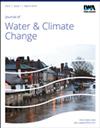利用 CMIP6-GCMs 确定埃塞俄比亚两个不同地区的干旱指数和潜在蒸散量的特征
IF 2.7
4区 环境科学与生态学
Q2 WATER RESOURCES
引用次数: 0
摘要
本研究利用三个全球气候模型的集合,旨在估算气候变化,并量化埃塞俄比亚两个不同地区的干旱程度和蒸散量的变化。为了调整气候数据集的偏差,使用了水文模拟工具(CMhyd)。这些研究最初使用观测站数据运行,并采用了短期(2011-2040 年)和中期(2041-2070 年)的共同社会经济路径方案。与气候相关的干旱度是用 De Martone 和联合国环境规划署的干旱度指数来衡量的。研究结果显示,西部和东部集水区在参考期(1981-2010 年)的年平均气温分别上升了 1.5 ℃ 和 0.06 ℃,年降水量分别减少了 15.73 毫米/年和 3.68 毫米/年。这些都改变了历史上支持干旱的地理区域的气候。到 2070 年代,西部和东部集水区的蒸散量可能分别增长 24.6% 和 21.6%。这一观测结果表明,西部集水区可能比东部集水区经历更明显的气候变化和波动。这一观测结果会影响农业、水资源管理以及干旱易发地区居民的社会和经济福祉。本文章由计算机程序翻译,如有差异,请以英文原文为准。
Characterizing the aridity indices and potential evapotranspiration using CMIP6-GCMs in two distinct regions of Ethiopia
Using an ensemble of three global climate models, the current study aims to estimate climate change and quantify the changes in the aridity and evapotranspiration of two distinct areas in Ethiopia. To adjust for bias in the climate dataset, the Hydrological Modeling Tool (CMhyd) was used. These studies were initially run using station data and employed the shared socioeconomic pathways scenarios for the short-range (2011–2040) years and medium-range (2041–2070) years. Climate-related aridity is measured using the De Martone and United Nations Environment Programme aridity indices. The study's findings for the western and eastern catchments for the reference period (1981–2010) years reveal an average annual temperature rise of 1.5 and 0.06 °C and a drop in annual precipitation of 15.73 and 3.68 mm/year, respectively. These alter the climate in the geographical areas that have historically supported drought. Evapotranspiration in the western and eastern catchments may grow by up to 24.6 and 21.6%, respectively, by the 2070s. The observation implies that the western catchment may experience more pronounced climate change and volatility than the eastern one. The consequences of this observation influence agriculture, water resource management, and the social and economic well-being of those living in drought-prone areas.
求助全文
通过发布文献求助,成功后即可免费获取论文全文。
去求助
来源期刊

Journal of Water and Climate Change
WATER RESOURCES-
CiteScore
4.80
自引率
10.70%
发文量
168
审稿时长
>12 weeks
期刊介绍:
Journal of Water and Climate Change publishes refereed research and practitioner papers on all aspects of water science, technology, management and innovation in response to climate change, with emphasis on reduction of energy usage.
 求助内容:
求助内容: 应助结果提醒方式:
应助结果提醒方式:


